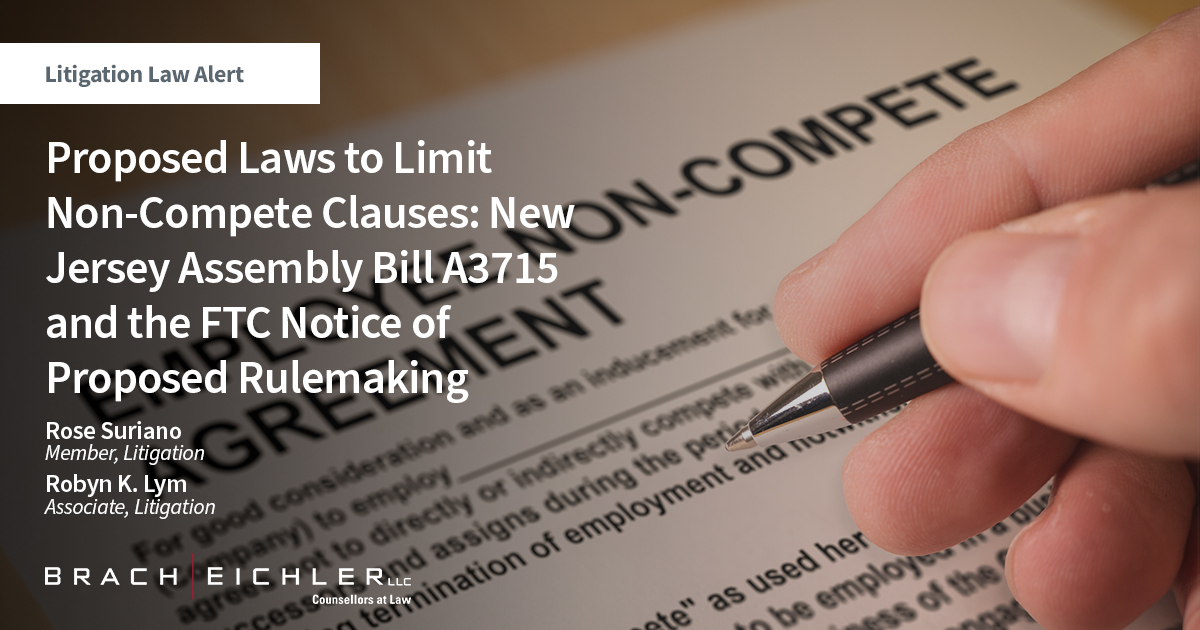Proposed Laws to Limit Non-Compete Clauses: New Jersey Assembly Bill A3715 and the FTC Notice of Proposed Rulemaking

April 24, 2023
Proposed Laws to Limit Non-Compete Clauses: New Jersey Assembly Bill A3715 and the FTC Notice of Proposed Rulemaking
For decades, non-compete clauses have been used to protect a business’ intellectual property, trade secrets, and confidential and proprietary information, including client information, pricing, and marketing strategies. Recently, despite decades-long precedent, non-compete clauses have come under strict scrutiny in New Jersey and nationally. The sentiment is that non-compete clauses stifle competition and may unfairly restrict an employee’s rights to obtain employment with other companies by limiting when or where an employee can work after leaving a job. The following provides an overview of some of the proposed changes, nationally and in New Jersey.
New Jersey Assembly Bill A3715

Follow Us on LinkedIn
Stay updated with our latest news and insights.
In May 2022, Assembly Bill A3715 was introduced to the New Jersey Legislature to limit non-compete clauses and the enforceability of broader clauses. If passed by the Legistalture, Assembly Bill A3715 proposes several changes to the law on non-compete clauses as follows:
- Non-compete clauses would be unenforceable against a wide category of workers, including independent contractors, employees who are laid off or terminated for reasons other than misconduct, low-wage employees, student interns, and apprentices and employees under the age of 18;
- Non-compete clauses would be unenforceable against any employee whose period of service to an employer is less than one year, with no restrictions based on that employee’s knowledge, experience, skillset, or compensation.
- An employee’s non-compete period would be limited to a maximum of 12 months from the employee’s termination date;
- An employer would not be able to prevent an employee from seeking employment in another state;
- The geographic limitation of a non-compete clause would be limited to the areas in which the employee provided services, or had a material presence or influence in the last 2 years prior to the employee’s termination;
- An employer would be required to disclose the terms of its non-compete agreement in writing to any prospective employee at the time a formal offer of employment is made;
- The employer would be required to notify the employee in writing of its intent to enforce the non-compete agreement within 10 days of the employee’s termination of employment; and
- An employer must pay an employee 100% of the employee’s pay for the post-employment period in which the clause is in effect, and continue to pay an employee’s benefits.
The Federal Trade Commission’s Proposed Rule
On a national level, non-compete clauses are also under attack and the proposed changes are even broader than those proposed in the New Jersey Bill. On January 5, 2023, the FTC announced a Notice of Proposed Rulemaking that, if passed, would prohibit and rescind non-compete clauses in employment contracts and preempt all state laws providing lesser protection than the proposed rule. If passed, this law would affect all non-compete provisions nationally, although the authority of the FTC to enforce the Rule, if passed, is questionable.
The FTC’s proposed rule is based on its November 10, 2022 Policy Statement — as well as President Biden’s July 2021 Executive Order calling for the Commission to limit non-compete agreements. The Notice of Proposed Rulemaking labels non-compete agreements as unfair methods of competition under Section 5 of the Federal Trade Commission Act. 15. U.S.C. § 45(a)(1). The proposed FTC rule would:
- Prohibit an employer from entering into or attempting to enter into a non-compete clause with a worker; and
- Require employers to rescind existing non-compete clauses with workers in writing, by stating that the agreement is no longer in effect and will not be enforced.
Currently, the only exception to this broad proposal is a limited exclusion for non-compete clauses between the seller and buyer of a business. As expressed by Commissioner Wilson in her dissent to the proposed change, the proposed rule seeks to reverse over a hundred years of legal precedent on this issue, which she believes will result in substantial and protracted litigation. Commissioner Wilson also noted that the Commission lacks authority to engage in this rulemaking, and the rulemaking may violate several federal doctrines, which would ultimately require the Supreme Court to address this issue once the FTC acts.
These state and national acts and others have impacted the enforceability of non-compete clauses. A company can still protect its trade secrets, intellectual property, and other confidential and proprietary information by other means, including non-solicitation agreements and confidentiality agreements. Current non-compete clause should be carefully reviewed to ensure that the restrictions on the employee are clear and specific and meet current trends .
If you have any questions about this alert, please contact:
Rose A. Suriano, Esq., Member, Litigation Practice, at rsuriano@bracheichler.com or 973-403-3129
Robyn K. Lym, Esq., Associate, Litigation Practice, at rlym@bracheichler.com or 973-403-3124














